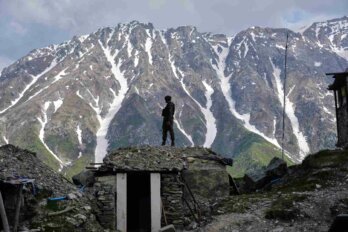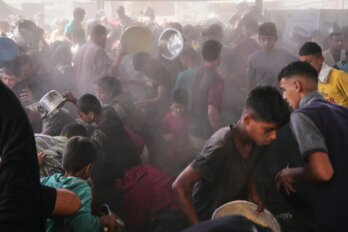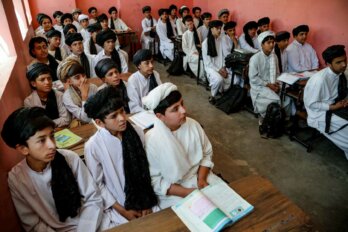Where are you from? For most of my life, I have avoided this question. It’s too much to explain. Where would I even begin? My own story is just one tiny part of my family’s history. I can’t tell my story without telling theirs. But, for a long time, I struggled to tell even my story. Not because it was long-winded or complicated, though it was, but because I didn’t think that most people would believe me.
The first time I confronted this feeling was in 2004, when I was a second-year theatre student at the University of British Columbia, in Vancouver (located on the traditional, ancestral, and unceded territory of the Musqueam people). I was a naive eighteen-year-old, an immigrant who had arrived in Canada only seven years earlier. In teen years, that’s about half a lifetime. In one of my first classes of the semester, as a small group of us stretched in our sweatpants and socks (our typical uniform for theatre classes), a classmate began to regale us with stories of her summer travels to Israel. The holiday had been courtesy of the state-funded program Birthright Israel, which offers free trips to young members of the Jewish diaspora between the ages of eighteen and thirty-two.
I remember her turning to the group and asking if we’d ever been there. Had we seen the beautiful beaches in Haifa? Floated in the Dead Sea? Partied all night in Tel Aviv?
My body reacted before my brain could process what was happening. I burst into tears, grabbed my backpack and my shoes, and ran out of the building. As I stood outside in the rain, the first feeling to wash over me was shame for the things I hadn’t said. Of course I had never experienced those things. I’m Palestinian, and I have no interest in going to the places she described because I’ve heard terrible stories about my people being harassed by the Israel Defense Forces.
If I had spoken up for myself, would everyone have thought I was attacking her personally? Would anyone have understood? Would anyone have even cared?
In 2021, almost two decades after the incident, the answer may finally be yes.
The story of where I’m from follows two generations. My grandfather is ninety-five years old—twenty-two years older than the state of Israel, which was formed in 1948—and a survivor of what Palestinians call “The Nakba,” or “The Catastrophe,” when he and his family were forcibly displaced from their home by British soldiers, colonialism’s midwives, who were escorting a new wave of European Jewish families into Palestine shortly after the Second World War.
My jiddo currently lives alone, in a senior care facility in North Vancouver, instead of spending his remaining days among friends and neighbours in his rightful home of Ramlah—the place where he grew up, among his family’s life-sustaining olive groves and orchards, their olive presses and their flour mills. The place where he chased chickens and played soccer with his brothers and sisters.
All of us grandkids remember jiddo’s Nakba story: the British Army told them to leave their homes but that they would be allowed to come back in a few weeks. So they took almost nothing, locked their doors, and like thousands of other Palestinians, began to walk through the desert.
“This is the part where the story gets a bit dramatic,” I remember jiddo saying to us in hushed tones. Palestinians are storytellers by blood, you see. As night fell and darkness beset them, jiddo would tell us, he felt a strange squishing under his feet, followed by a quiet yelp. He had stepped on somebody. He couldn’t see, but it turned out that his fellow exiles had dropped to the ground in fatigue, to sleep under the cover of night. Jiddo had no choice but to do the same. Eventually, my grandfather and his father managed to hitch a ride with a truck driver into Egypt.
Two generations later, you have me. Yet the question of where I am from is one that still feels almost impossible to answer. I’m Palestinian by blood, but I was born in Kuwait. The Gulf War sent us to Abu Dhabi and then, after my father passed away suddenly, to Vancouver, where my grandparents had been for years.
I have heard worse stories of Palestinian children currently living in Gaza and Sheikh Jarrah—occupied Palestinian territories in Israel—who mark their lives by the number of wars they’ve survived.
Supporters of Palestine have always popped up in unexpected places throughout my travels: a shawarma stand in the small fishing village of Taganga, in Colombia; an Irish chap I met at a hostel in Thailand, who hugged me tightly and proclaimed, “Your fight is our fight!”; a Swedish Palestinian barista in a San Francisco coffee shop who asked me whether my family left in ’48 or ’67. (Mine was ’48, his ’67.) In every one of those moments, I remember never having felt so connected and so seen. I’d lock those memories inside myself like little treasures for safekeeping. I was raised to keep a mental go bag ready for when we fall on hard times.
When I think back to that moment in 2004, in my drama class, I remember how cagey I felt. Pointing to a map wasn’t going to help me make a case for why programs like Birthright were offensive to people like me or explain how the program fails to mention the other citizens who are blocked from basic resources by giant cement walls. But I was a teenager then, tired, lonely, and aching to fit in anywhere. All I wanted to do was live my life. I wasn’t interested in being a walking history lesson.
Back then, if I wanted to learn about Palestine, I had to hunt down that information. While the internet had become widely available, it didn’t yet have social media’s power to connect young Palestinians chronicling their daily lives under siege for all the world to see. Back then, I mainly used the internet to access information about faraway places, but even that wasn’t always easy. I still had to scavenge for copies of international newspapers, ask librarians to teach me how to use the microfiche machine so that I could look through archives, or pore over thick stacks of academic books and journals. I knew that few others would be invested enough to do that. I worried that anything I said about being Palestinian would sound like hearsay.
But things are starting to change.
A few short years after my drama-class incident, social media hit the masses. Like the rest of the world, I marvelled at how this new medium was paving the way for a generation of citizen journalists. More recently, I saw the power of it when Black Americans deftly and expertly wielded social media to hold those in power accountable for their actions in 2020.
When tensions in Palestine erupted again, in May 2021, I spent my time floating between my daily life in Vancouver and my online life promoting the posts and the words of powerful Palestinian activists and journalists like Mohammed and Muna El Kurd, twenty-three-year-old siblings who used Instagram to live-stream the violence they saw on their streets. Their videos reach more than 2 million people around the world—many of them likely young and new to the conflict.
For the first time in my life, I can experience the joys of our resistance. And, if I’m completely honest, the tiniest bit of relief. I don’t have to hunt for proof of my existence anymore. Now, it’s right there in front of me, ready and waiting for me to reshare it. Though I can see the world moving on after news of the “ceasefire,” I know that my silence is no longer an option. I need to speak up and keep speaking up, especially as Palestinian families across Jerusalem continue to face forced displacement from their homes.
To be Palestinian is to constantly lament a life that never was and perhaps never will be. Yet we never give up hope. We’ve long since lost our faith that governments will rescue us, but we’ve never lost faith in the power of everyday people just like us.
As the worldwide Palestinian community calls for justice and a recognition of our shared humanity, I think about my jiddo, whom I still see for weekly Saturday visits. All I pray for, before every time I see him, is that I can come bearing the good news that he can finally go home.





